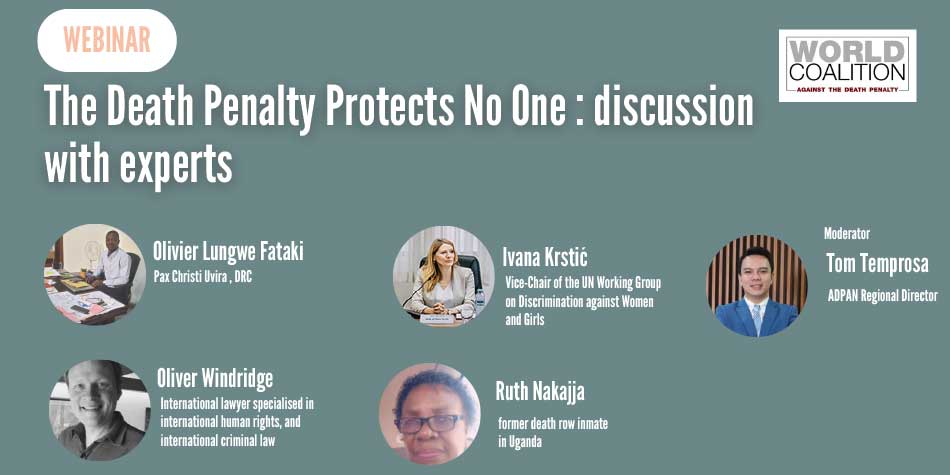Mali: is abolition in sight?
Abolition
This spring, human rights activists in Mali have been leading an active movement to support the government’s draft law on abolishing the death penalty. Their information and awareness raising campaign supports a controversial proposal whose adoption was dismissed last year.
Action has increased since the draft was adopted by the Council of Ministers on 17 October 2007. On 31 October Saloum Traoré, Executive Director of the Mali section of Amnesty International, participated in a joint press conference with the Justice Minister who presented the text. The organisation has since increased its media operations, for example obtaining an hour’s broadcasting time on the Africable television channel.
The Action by Christians for the Abolition of Torture (ACAT-Mali) is working closely with Amnesty International. Together, the two organisations organised a series of football tournaments where banners placed around the stadium presented the arguments in favour of abolition. At half-time a speaker told the spectators in the local language about the ineffective and inhuman nature of the death penalty.
“These events are appreciated and we are making great progress”, confirmed Bernard Sagara, President of ACAT-Mali.
Activists are putting particular emphasis on the moratorium on executions which Mali has respected since 1984. Despite the absence of executions, the country continues to sentence prisoners to death. According to Amnesty International, at least ten death sentences have been passed since February.
Abolitionists are also underlining the case of neighbouring Senegal which, like Mali, has a mostly Muslin population and where the President abolished the death penalty without provoking a crisis or losing the confidence of the voters who subsequently re-elected him.
First attempt adjourned
Activists are redoubling their efforts because an initial attempt to push through the abolition law was adjourned at the end of 2007 in the face of the combined criticisms of the opposition party and Mali’s High Council of Islam.
Representatives from Amnesty International and ACAT-Mali met with the Ulamas when the draft was only a promise from the Malian President, Amadou Toumani Touré. “They were very polite and showed us several chapters in the Koran which demonstrate that killing is wrong, before finally reaching the conclusion that those who kill must be killed”, said Bernard Sagara.
An opposition party which is not represented in parliament and supposed to be close to political Islam, the Union nationale pour la renaissance (UNPR), has also contested the draft and called for demonstrations against abolition of capital punishment.
“We will never let the founding values of our society be led astray to obtain crumbs of subsidies from the Europeans. We support the principle of a life for a life, an eye for an eye, an ear for an ear and a tooth for a tooth”, declared its leader, Madibo Sangaré. In his view, abolition is being imposed by the European Union as a condition for ongoing development aid.
The campaign led by death penalty supporters is coupled with a dispute over reform of the Family Code and claims to have its roots in Islam, which has earned it some support in this mainly Muslim country.
Support from religious figures and universities
However, the abolitionists’ campaign recently received the support of other Muslim scholars who are highlighting the fact that, according to the Koran, it is forbidden to kill. Voices are also being raised against capital punishment at universities. “Death cannot be reversed. A legal error or injustice in its application would therefore be totally irreparable. A person who is wrongly imprisoned can always be released and compensated”, wrote the Law Professor Boubacar Diarra in a column published by the daily newspaper Le Républicain.
Meanwhile, on 15 May the Justice Minister reconfirmed the Government’s commitment to ensuring that the abolition law is adopted before the UN Human Rights Council (photo). “We have a majority, we can get this draft through, even tomorrow”, he declared (watch his speech in this video). However, he insisted on the need for “dialogue and cooperation” to avoid “Mali being cut in two” after abolition.
He is committed to pushing the law through “before the end of the Head of State’s mandate”, i.e. before 2012 – which means that a further delay cannot be excluded.
However, at Amnesty International Saloum Traoré believes that the death penalty will be abolished by the end of the parliamentary session on 5 July, and is asking the Government not to retreat in the face of changeable public opinion. “This should be a political decision, in Mali and the rest of the world”, he said.







